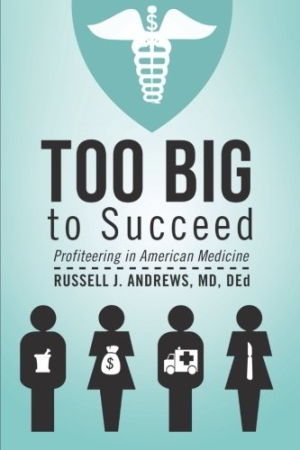Too Big to Succeed
Profiteering in American Medicine
Citing abuses to the medical system, Andrews offers a clear doctor’s perspective on much-needed changes to American health care.
“Though we spend 50% more on health care per capita than other developed countries, a multitude of measures—such as life expectancy and infant mortality—indicate that we in the United States are not getting health-care value for our money,” says veteran physician Russell J. Andrews. In his new book, Too Big to Succeed: Profiteering in American Medicine, Andrews investigates how the US health care system has become increasingly more expensive and less effective, and how Americans have been lulled into accepting less bang for their buck.
Andrews identifies what he believes are common abuses of the “art” of medicine: physicians pushing new, expensive medications and devices (the development cost of which must be recouped) on unwitting, often desperate patients; the dissolution of doctor-patient trust through the now passively accepted practice of overscheduling; and utilization of “hospitalists” (physicians whose primary professional focus is the general medical care of hospitalized patients) who don’t know the patients personally, as the only on-call contacts.
Andrews, a neurosurgeon who has seen how health care works all over the world, starting from his time as a Peace Corps volunteer in the Palau Islands, illuminates how he believes the objective of our health care system has devolved from healing patients to profiting off of them. Doctors declare they can’t make enough money from simple procedures, as in the example of an over-the-counter back brace relieving pain for many people, but physicians preferring to recommend complex, invasive, and very expensive spinal surgeries.
Finally, the author outlines measures that can be taken, individually and as a society, to reverse this trend: treating health care as a societal necessity rather than an individual one (much like fire and police protection); returning health care delivery to the local level (similar to local school districts); or patients diligently seeking alternative health-care services that provide the ideal “one patient-one doctor” relationship.
As the health care debate in our country rages on, Andrews has picked an opportune time to release his informative treatise on the subject. Too Big to Succeed is strategically researched, with a full bibliography and index*.* Though much of Andrews’s evidence is anecdotal—he cites many incidents he has privately observed or had reported to him—he shares a perception that many medical practices and specialty clinics have, by growing and taking on corporate models of functioning, become more self-protective, forcing sources to work “undercover.”
The case for smaller scale, more personalized medical care is well organized and easy to comprehend. The book asks us to consider the facts and “review the evidence and draw [our] own conclusions—and then act on those conclusions.” The book is logical and informative, clearly the product of a professional in the field who has given the issues much thought.
Too Big to Succeed provides a well-researched, well-reasoned road map of how our health care system reached such an untenable state, and what “average Americans” can do about it. Because so many people have complaints about the current state of their medical care, the book may set off a spark that will spread into a fire of general interest.
Reviewed by
Barbara Bamberger Scott
Disclosure: This article is not an endorsement, but a review. The publisher of this book provided free copies of the book and paid a small fee to have their book reviewed by a professional reviewer. Foreword Reviews and Clarion Reviews make no guarantee that the publisher will receive a positive review. Foreword Magazine, Inc. is disclosing this in accordance with the Federal Trade Commission’s 16 CFR, Part 255.

